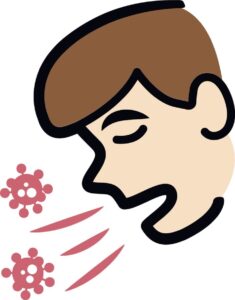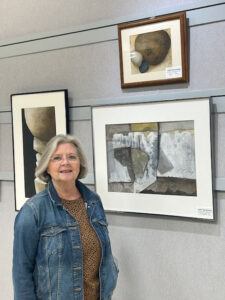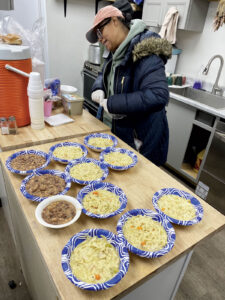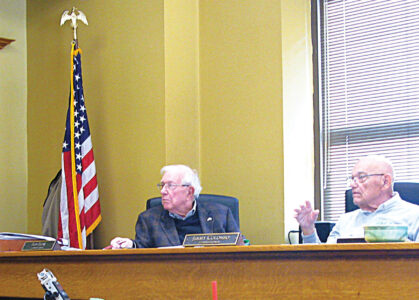VA offers peer support for vets
PARKERSBURG – Two veterans who found themselves homeless and at rock bottom have been able to pull themselves back from oblivion, one helping the other.
Veterans who are homeless, have Post Traumatic Stress Disorder, are having trouble adjusting to life back home, suffering from flashbacks, nightmares, using drugs or alcohol to try to forget, having family problems, or trouble at work can find help through a Peer Support Program, which began about three years ago at the Wood County Community Based Outpatient Clinic for Veterans in Parkersburg.
Kevin Bower, 56, said because he’s lived the life and understands what fellow veterans are going through, he’s able to reach out and help pull them back from the abyss. Bower is the certified peer support specialist at the Veterans Clinic in Parkersburg.
“I’m an equal; we develop a rapport; we have a similar background, and from that, we develop a working relationship. I share with them the rough times I went through and how I was able to recover,” Bower said.
Bower, who is originally from Fairmont, went through a rehabilitation program at the Clarksburg VA and was diagnosed with BiPolar Disorder. At one point he was living in a homeless shelter.
“I attended aftercare, a residential program, went to recovery groups,” Bower said. The veteran served 19 years in the U.S. Army, West Virginia National Guard and U.S. Army Reserve and also served as a military occupation specialist. During his military career, he spent time in 14 countries and 38 states.
Bower had suffered from BiPolar Disorder, but was not aware of his condition. When he was finally diagnosed, he had to deal with his condition and educate himself and others about it.
“There was a real stigma in those days around mental illness, and I didn’t know what was wrong and was self-medicating,” Bower said. His marriage had fallen apart, he was drinking alcohol, got into some trouble with the law and wound up in prison for several years. After he got out, he went through the deaths of some family members and friends and ended up homeless.
“I was living in the woods,” he said.
Finally some relatives took him to the VA Hospital.
“It was 18 years of pure mental hell,” he said.
“If I had not gotten the help I got through the VA I would be living in tent city right now,” he said. “But I didn’t get here by myself. One lady, Tammy Reid, who as a homeless coordinator in Clarksburg, reached out to help me,” he said.
“He was given a tool box and tools and when he does treatment in the Peer Support group now he is able to use one of those tools he received, pull it out, and figure out how to help himself first, then help others. It’s rehabilitation, therapy for himself also,” said Wesley Wells, public information specialist with the VA Medical Center.
Bower said through the VA he was able to link to other needed services; he had attempted suicide; he received treatment, was prescribed the proper medication and was able to become stabilized. He received employment services, got a job and went back to Fairmont College to continue his education.
Bower said he had flashbacks and the road to recovery was neither simple nor quick.
“It was and still is difficult, but they provided me with a bridge. Now my providers are my colleagues. I work here with the Peer Support Program. I am working with them to help others who find themselves in the situation I was living. It’s all about having a support system; you have to have that support system,” Bower said.
Bower said the program and the help received saved his life, and provided a solid foundation for him to “build a healthy happier life.”
He now helps others, working with other vets.
“But it’s all about being motivated to help yourself; it’s like being lost down a dark tunnel then finally seeing light at the other end,” Wells said.
Stephen Reynolds, a Vietnam-era vet, also found himself in a very dark place.
In the Military Police in the U.S. Army, Reynolds’ military career included time in Vietnam.
“You see things and do things you don’t want to do,” he said; attempting to deal with those troubles he turned to drugs to try to help him forget, if even for a little while.
Like many Vietnam vets he went into the Army still a teen.
“When I came out I was a man, but inside I was still a kid,” he said.
To cope with flashbacks and nightmares he suffered after discharge, Reynolds turned to drugs to try to keep the wolves at bay.
He ended up in the hospital several times after overdosing; his marriage ended; he had family concerns.
“My kids were very concerned about me. I was very depressed. I wasn’t even out a year before I overdosed. I kept dreaming about things that happened over there. I just couldn’t handle it. I was taking the drugs, trying to medicate myself to try and deal with it, forget for a while,” he said.
Reynolds said stress situations or pressure triggered the drug use. He ended up at the VA Hospital in Clarksburg, went through rehabilitation programs, tried dealing with anger issues, and was suspended from his job.
“I just kept doing the things I was doing.” Then he met a social worker at the VA hospital who reached out to him.
“She referred me back here (to Parkersburg); she was a lot of help,” he said.
Reynolds said at one point while he was fighting his demons, he ended up in the hospital, and began having convulsions.
“I really thought that was it. I saw Jesus standing in the corner of the room, that’s the truth. I said Lord either take me or help me,” Reynolds said. “It was that moment that turned my life around. The next day at group, I got up and told everyone my story.
“I realized I needed to get out of what I was doing. I wanted to get better for me and for my family. My son talked to me. I went through the programs, did counseling, I got help with the drug use. I did a lot of bad things including numerous suicide attempts, then I finally realized what had to be done,” he said.
He was diagnosed with diabetes and had had heart problems.
“I was homeless for about five years. I was sleeping in my car or at the homes of family members,” he said. “I was really lost.
“Then I accepted responsibility and I made a change. The Peer Support group has really been a lot of help to me. It showed me I really needed help and I wanted to get off the stuff. I go to church now. I have an apartment. Kevin is a great guy and he’s done a lot for me. It’s work, you have to keep working at it,” Stephens said, noting there is no magic cure.
“After that moment in the hospital, my son talked to me, and I said OK I am going to do this. I didn’t think about my family when I was taking the drugs. I didn’t think about what it was doing to them. Now I’m enjoying life, enjoying my kids and my grandchildren,” he said.
“My life is much better. I like to tell everybody – you have to get to the stage where you are willing to change. It’s really good to feel good again after all these years. I was a different man when I came back from Vietnam. I was grown up, but I was still a kid,” he said. “I can honestly say today, I feel better, but it took a long time. But I had to do things over there and I couldn’t cope with it. It took a long time for me to come around. The Peer Support group gave me determination and self-respect again and that’s what I really needed,” Reynolds said.
For more information on the Peer Support Services available to veterans through the Veterans Health Administration contact the Wood County Community Based Outpatient Clinic for Veterans at 2311 Ohio Ave., Suite A, Parkersburg, next to the Memorial Bridge, 304-422-5114. The parent facility is the Louis A. Johnson VA Medical Center, Clarksburg. The phone number for the Clarksburg facility is 304-623-3461 or 1-800-733-0512.






